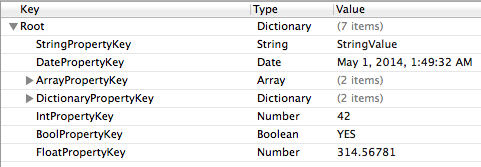A Class For Easily Interacting With Plists as Objects via Automatically Set Properties
Last Updated: 20 May 2014
###What is it, and why do I need it?
PlistModel was created to have interaction with Plists be as simple and pleasant as possible. Sometimes a project requires persistance that just begs to be stored in a Plist. Whether you need to generate mutable Plists dynamically, or read Plists from the main bundle, this class makes interaction simple and painless.
###Features
- Automatically populates Plist values into matching properties at runtime.
- Works with bundled Plists, or creates new ones automatically
- Automatically saves
- Background methods to keep UI snappy
- Smart saving only writes files if dirty
###Set Up - Using a Custom Plist included in Bundle
####Step 1: Set up your Plist
In CustomModel.plist
####Step 2: Add Corresponding Properties to Subclass
In CustomModel.h
#import "PlistModel.h"
@interface CustomModel : PlistModel
@property (strong, nonatomic) NSString * stringPropertyKey;
@property (strong, nonatomic) NSDate * datePropertyKey;
@property (strong, nonatomic) NSArray * arrayPropertyKey;
@property (strong, nonatomic) NSDictionary * dictionaryPropertyKey;
@property int intPropertyKey;
@property BOOL boolPropertyKey;
@property float floatPropertyKey;
@endThe logic that connects Plist keys to properties is case insensitive. Do not duplicate keys in your Plist or this may cause errors.
####Step 3: Load and Use Plist
[CustomModel plistNamed:@"CustomModel" inBackgroundWithBlock:^(PlistModel *plistModel) {
// Get our custom model from return block
CustomModel * customModel = (CustomModel *)plistModel;
NSLog(@"\n");
NSLog(@"** CustomModel.plist **");
NSLog(@"CM:StringProperty: %@", customModel.stringPropertyKey);
NSLog(@"CM:DateProperty: %@", customModel.datePropertyKey);
NSLog(@"CM:ArrayProperty: %@", customModel.arrayPropertyKey);
NSLog(@"CM:DictionaryProperty: %@", customModel.dictionaryPropertyKey);
NSLog(@"CM:IntProperty: %i", customModel.intPropertyKey);
NSLog(@"CM:BoolProperty: %@", customModel.boolPropertyKey ? @"YES" : @"NO");
NSLog(@"CM:FloatProperty: %f", customModel.floatPropertyKey);
NSLog(@"\n");
}];The properties are automatically populated at runtime without any additional code. Running in background is optional, but loading files from the directory can sometimes be an expensive operation. Background methods are suggested.
###Set Up - Dynamically Created Plist - MUTABLE
####Step 1: Declare properties you'd like to use in .h
In DynamicModel.h
#import "PlistModel.h"
@interface DynamicModel : PlistModel
@property (strong, nonatomic) NSString *name;
@property int counter;
@end
####Step 2: Interact with your Plist:
[DynamicModel plistNamed:@"DynamicModel" inBackgroundWithBlock:^(PlistModel *plistModel) {
DynamicModel * dynamicModel = (DynamicModel *)plistModel;
// Will be null on first run
NSLog(@"DynamicModel.name = %@", dynamicModel.name);
NSLog(@"Counter: %i", dynamicModel.counter);
dynamicModel.name = @"Hello World!";
dynamicModel.counter++;
NSLog(@"DynamicModel: %@", dynamicModel);
}];If no Plist already exists at the specified name, a new one will be created automatically. PlistModel will save in the background automatically on dealloc or you can call save explicitly using saveInBackgroundWithBlock.
###Set Up: Using the Default Info.plist
####Step 1: Call PlistModel w/o Subclassing
[PlistModel plistNamed:@"Info" inBackgroundWithBlock:^(PlistModel *plistModel) {
NSLog(@"\n\n\n");
NSLog(@"** Info.plist **");
NSLog(@"Development Region: %@", plistModel.CFBundleDevelopmentRegion);
NSLog(@"Version: %@", plistModel.CFBundleVersion);
NSLog(@"Application requires iPhone environment? %@", plistModel.LSRequiresIPhoneOS ? @"YES" : @"NO");
// Etc ... (see PlistModel.h for full list)
NSLog(@"\n\n\n\n");
}];You can find more available properties in PlistModel.h
##Dynamic Keys
You can also interact with PlistModel as if it is a mutableDictionary for keys that you might not know ahead of time and thus can't set as properties. For these situations, you can use:
instanceOfPlistModel[@"dynamicKey"] = @"dynamicValue";
NSString * dynamicValue = instanceOfPlistModel[@"dynamicKey"];###NOTE:
- Working with values this way will be a touch slower than working with properties.
- Keys are case insensitive which means
instanceOfPlistModel[@"foo"]andinstanceOfPlistModel[@"fOo"]andinstanceOfPlistModel[@"FOO"]will all ultimately point to the same address.
